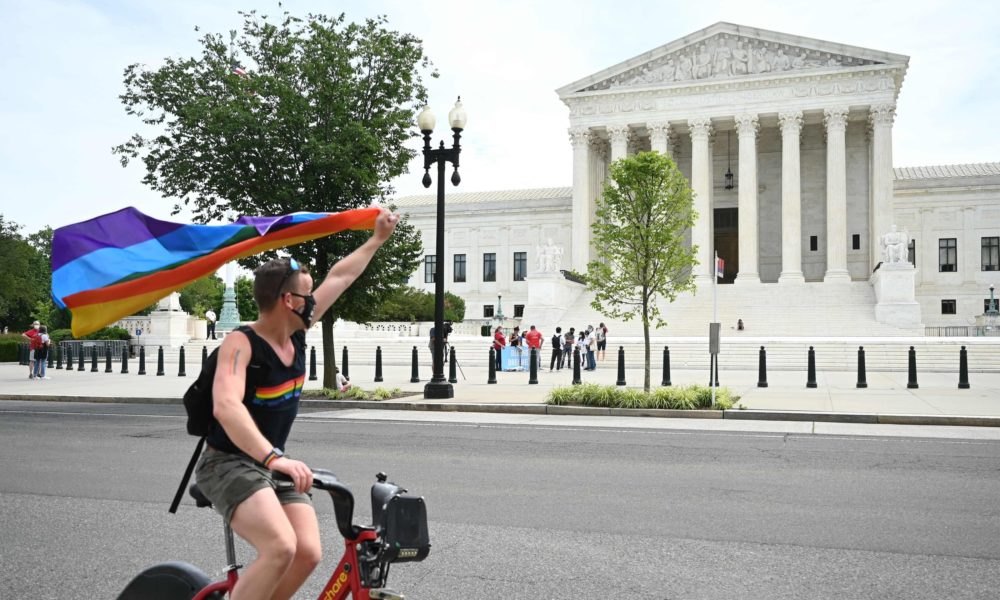Workplace discrimination
OPINION
Richard Cordray, Opinion contributor
Published 7:00 a.m. ET June 25, 2020 | Updated 7:30 a.m. ET June 25, 2020
CLOSE![]()
The Supreme Court ruled LGBTQ workers cannot be fired under Title VII of the 1964 Civil Rights Act. Trump appointee Neil Gorsuch wrote the decision.
USA TODAY
Workplace discrimination Supreme Court ruling in Bostock means means LGBTQ consumers cannot be refused a loan or be subjected to less favorable terms for credit.
In Bostock v. Clayton County, the Supreme Court held that Title VII of the Civil Rights Act protects Americans against workplace discrimination based on sexual orientation or gender identity. The decision will likely have major ripple effects, expanding LGBTQ+ rights in many other areas, including federal consumer protections in the financial marketplace.
The Court’s decision in Bostock surprised many. The Civil Rights Act protects people from being hired, fired, denied a promotion, or discriminated against in their terms of employment “because of … sex.” For over fifty years, the courts consistently held that the statute does not protect people from workplace discrimination based on sexual orientation. But in 2015, the Equal Employment Opportunity Commission broke ranks in Baldwin v. Foxx, reasoning that discrimination based on sexual orientation is “inseparable from and inescapably linked to” (with discrimination based on sex. This new reasoning proved persuasive, and soon federal appeals courts in Chicago, New York, and Cincinnati followed suit. The same analysis has now won the day in the Supreme Court by a strong 6-3 verdict.
Workplace discrimination Interpreting ‘sex’ in the text of the law
Importantly, the decision was based narrowly and explicitly on the Court’s reading of the text of the law, specifically the crucial phrase “because of … sex.” Disregarding evidence of congressional intent or legislative history — as is becoming more and more the norm — the Court waved away the overwhelming indications that nobody in the 1964 Congress meant the law to cover sexual orientation. Likewise, the Court gave no weight to the fact that legislators for years have unsuccessfully sought to amend the statute by adding language to broaden its coverage in this manner. Instead, Justice Gorsuch’s majority opinion told us simply that the law means what it says, and the Court’s ruling now says what it means: the term “sex” encompasses “sexual orientation.”
The Bostock decision’s analysis will now serve as the key precedent for interpreting many other laws that contain language functionally identical to the text of Title VII. Indeed, in the be-careful-what-you-wish-for category, Justice Alito’s dissenting opinion made this clear. His Appendix C helpfully identified more than 150 other federal statutes that likewise prohibit various forms of discrimination “because of … sex” or “on the basis of … sex,” and he ominously noted that the Court’s interpretation now applies to them all. Because the Bostock decision emphatically relied solely on the textual language, to the exclusion of all else, the possibility of distinguishing its reasoning in contexts other than the military (which has its own unique precedents) is virtually nil.
COLUMN: Transgender athletes don’t belong in girls’ sports. Let my daughter compete fairly.
So, what does any of this have to do with consumers? Among those other statutes are key provisions for consumer financial protection. Justice Alito’s list contains federal laws barring discrimination in housing sales, housing rentals, mortgage assistance, brokerage services, student loan programs, workforce development, equal pay, public health services, public assistance, and much more. In all these areas, discrimination based on sexual orientation now appears, quite clearly, to violate federal law.
Workplace discrimination ECOA’s barring of discrimination based on sex
And the centerpiece of all federal consumer financial protection is the Equal Credit Opportunity Act of 1974, which generally bars discrimination against any applicant for any credit transaction “on the basis of … sex.” ECOA and its implementing Regulation B guarantee fair lending practices to all Americans, making it illegal to deny credit or charge more for credit based on prohibited characteristics. The Consumer Financial Protection Bureau, along with the Justice Department, enforces this important law. In August 2016, the CFPB, which I led for its first six years, issued a letter stating that the fair lending laws cover discrimination based on sexual orientation and gender identity, expanding its scope of protection. We encouraged people to file consumer complaints on this basis as well. Some critics of that interpretation emerged, but they will now be met with the hydraulic force of the Bostock decision: the term “sex” includes sexual orientation and gender identity.
COVID-19: Increase in coronavirus cases was to be expected
For members of the LGBTQ+ community, protection under the federal consumer laws assures the economic opportunities that flow from access to credit. It means they can no longer be redlined or ousted from their homes. It means they cannot be denied public health services based on mere prejudice. It means they cannot be refused a loan or be subjected to less favorable terms unrelated to their credit standing.
In short, it means that the right to love who they choose will extend beyond marriage and carry forward into every aspect of their economic lives.
Richard Cordray was the first director of the Consumer Financial Protection Bureau. His new book Watchdog discusses the importance of protecting people in the financial marketplace.
Autoplay
Show Thumbnails
Show Captions
Read or Share this story: https://www.usatoday.com/story/opinion/2020/06/25/supreme-courts-lgbtq-workplace-ruling-means-fairness-consumers-column/3237603001/
